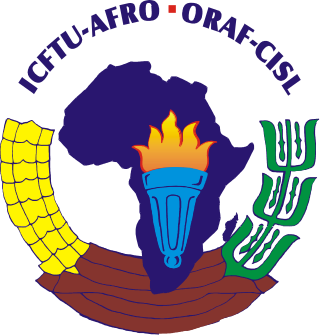Related Research Articles

The International Confederation of Free Trade Unions (ICFTU) was an international trade union. It came into being on 7 December 1949 following a split within the World Federation of Trade Unions (WFTU), and was dissolved on 31 October 2006 when it merged with the World Confederation of Labour (WCL) to form the International Trade Union Confederation (ITUC).

The World Federation of Trade Unions (WFTU) is an international federation of trade unions established in 1945. Founded in the immediate aftermath of World War Two, the organization built on the pre-war legacy of the International Federation of Trade Unions as a single structure for trade unions world-wide. With the emergence of the Cold War in the late 1940s, the WFTU splintered, with most trade unions from the Western-aligned countries leaving and creating the International Confederation of Free Trade Unions (ICFTU) in 1949. Throughout the Cold War, membership of the WFTU was made up predominantly of trade unions from the Soviet-aligned and non-aligned countries. However, there were notable exceptions to this, such as the Yugoslav and Chinese unions, which departed following the Tito-Stalin and Sino-Soviet splits, respectively, or the French CGT and Italian CGIL unions, who were members. With the end of the Cold War and the dissolution of the Soviet Union, the WFTU lost the largest portion of its membership and financial support. Since the start of the 2000s, the organization shifted headquarters to Athens and recruited new members, claiming to have grown from representing 48 million workers in 2005 to 105 million in 2022.

The World Confederation of Labour (WCL) was an international labour organization founded in 1920 and based in Europe. Totalitarian governments of the 1930s repressed the federation and imprisoned many of its leaders, limiting operations until the end of World War II. In 2006 it became part of the International Trade Union Confederation (ITUC), ending its existence as an independent organization.
Education International (EI) is a global union federation (GUF) of teachers' trade unions consisting of 401 member organizations in 172 countries and territories that represents over 30 million education personnel from pre-school through university. It is one of the world's largest sectoral global union federations.

The International Trade Union Confederation (ITUC) is the world's largest trade union federation.

The Association of Cinematograph, Television and Allied Technicians (ACTT) was a trade union in the United Kingdom which existed between 1933 and 1991.

The ICFTU African Regional Organisation (AFRO) was a regional organisation of the International Confederation of Free Trade Unions (ICFTU), representing trade unions from countries in Africa.

The ICFTU Asia and Pacific Regional Organisation (APRO) was a regional organisation of the International Confederation of Free Trade Unions (ICFTU), representing trade unions from countries in Asia and Oceania.
Alan Sapper was a British trade unionist.
The Plantation Workers International Federation was an international trade secretariat of the International Confederation of Free Trade Unions. PWIF was founded at the firth ICFTU world congress held in Tunis in July 1957. Samuel Powell Claret was appointed as the general secretary of PWIF and Tom Bavin as its Director of Organisation. PWIF was launched by ICFTU to organize plantation unions in the Third World.
The National Federation of Building Trades Operatives (NFBTO) was a trade union federation in the United Kingdom, consisting of unions with members in construction and related industries.

The International Graphical Federation (IGF) was a global union federation bringing together unions of printing workers around the world.

The International Federation of Commercial, Clerical, Professional and Technical Employees was a global union federation bringing together workers representing clerical workers. The union was sometimes known as the International Federation of Employees, Technicians and Managers, or informally as the International Federation of White Collar Workers' Unions.
Jacobus Hendrik Oldenbroek was a Dutch trade union leader and politician, who served as general secretary of the International Confederation of Free Trade Unions.

Bruno Storti was an Italian trade unionist and politician.
The International Federation of Petroleum and Chemical Workers (IFPCW) was a global union federation bringing together trade union representing workers in the chemical and oil industries.
The International Secretariat of Entertainment Trade Unions (ISETU) was a global union federation bringing together trade unions representing workers in the arts, media and entertainment industries.
The International Federation of Variety Artists (IFVA) was a global union federation bringing together trade unions representing entertainers other than musicians and actors.
The ICFTU European Regional Organisation (ERO) was a regional trade union confederation, bringing together national federations of trade unions in Europe.
The French Federation of Book Workers was a trade union representing printing workers in France.
References
- 1 2 3 Fattmann, Rainer (2002). The Long Road Towards Cooperation (PDF). Bonn: Hans Böckler Foundation. ISBN 3-89892-047-X . Retrieved 22 October 2019.
- 1 2 Coldrick, Percy; Jones, Philip (1979). The International Directory of the Trade Union Movement. New York: Facts on File. p. 217. ISBN 0871963744.